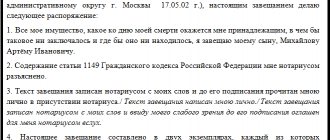Inheritance law involves several instruments that are binding upon the death of the testator and are formalized in the form of written orders. In a traditional will, a person typically states his will regarding his own property . At the same time, it is possible to draw up a testamentary assignment - an order regarding the obligation of the heirs to perform a certain action , both material and intangible. The procedure for the execution of a testamentary assignment is determined by the Civil Code (Civil Code) of the Russian Federation.
Procedure for drawing up a will. An example of including a testamentary assignment in it
The general procedure for drawing up a will is established in Art.
1118–1129 ch. 62 of the Civil Code of the Russian Federation (hereinafter referred to as the Civil Code of the Russian Federation). When expressing the last will, the following rules must be observed:
- the author has full legal capacity;
- the form of document preparation is written;
- personal disposal of property, without mediation (things can be any, even those that may be acquired in the future);
- certification of the will by a notary (in some cases, an official specifically specified in the law).
Note! According to Art. 1119 of the Civil Code of the Russian Federation, the testator can not only dispose of his property, but also give instructions for the commission of any actions after his death.
The latter is expressed in three ways:
- appointment of an executor of the will;
- the obligation to execute a testamentary refusal;
- imposing an obligation to perform any actions (testamentary assignment).
An example of a testamentary assignment can be downloaded here: Sample of a will with a testamentary assignment.
Note! From 01.06.2019, it is possible to assign responsibilities to an heir in exchange for the transfer of inheritance of property under an inheritance agreement (Article 1140.1 of the Civil Code of the Russian Federation).
Required documents
To prepare this type of will, you must provide the following documents:
- Passport;
- Documents on ownership, inherited property.
There is no single form to fill out. Key requirements are advisory in nature:
- Written document;
- Certified by signature;
- Confirmed by a notary or authorized person.
The form of presentation must be clear and have no ambiguous interpretations.
Rules for establishing a testamentary assignment
How to establish a testamentary assignment (hereinafter in this section - TZ) is described in Art. 1139 Civil Code of the Russian Federation:
- The person executing the will can be any heir, regardless of the method of inheritance, as well as the executor of the will, if property has been specially allocated to him for the execution of the will.
- Only actions with a generally beneficial purpose can be considered VP. They can be of both material and intangible nature. An example of a material generally beneficial purpose: to transfer funds in the bank account of the deceased to a charitable foundation. An example of an intangible goal: donating a valuable collection that is the property of the testator to a museum.
- In a separate provision, the legislator established that the EO is considered to be the order of the testator for the maintenance of his pets after his death.
Important! As of September 1, 2018, the list of situations in respect of which a testamentary assignment is possible has been expanded: any legal purposes are allowed, and not just socially useful ones (for example, the burial of the testator).
The LO is part of the will, therefore the rules for drawing up a will apply to it (strictly in writing, etc.) and, in fact, it can only contain the text of the LO, without disposing of the testator’s property.
The execution of the PO occurs after the opening of the inheritance.
When executing a legacy, the same procedure applies as when executing a testamentary refusal (clause 2 of article 1139 of the Civil Code of the Russian Federation). However, these 2 concepts are different.
Sample assignment under a will
In order to draw up a will in which there would be a testamentary assignment, a formal sample is not needed. The Civil Code of the Russian Federation contains minimum requirements regarding the form of a will:
- it must be in writing;
- it must be signed by the testator himself (or the impossibility of signing must be certified);
- it must be certified by a notary or a person equivalent to him.
In all other respects concerning the content and text of this document, the law does not impose any restrictions. Therefore, you can write a will, including one containing an assignment, in any form.
The testator can state his order in different ways.
The main thing is that the posthumous will be expressed clearly and unambiguously, without allowing for discrepancies.
Author of the article
The difference between a testamentary assignment and a testamentary refusal
Important! The main difference between these two orders from each other is the purpose for the sake of which the testator wills to perform certain actions: general benefit is characteristic of the assignment, and one aimed at satisfying the interests of a particular person is characteristic of the refusal.
Let's give an example. The citizen appealed to the court with a request to force the defendant to fulfill the testamentary assignment by collecting 30% of the cost of the testator's apartment. The plaintiff's actual demands for a certain amount of money were ultimately satisfied. However, during the consideration of the case, the judicial panel indicated that this order of the deceased is a testamentary refusal, and not a testamentary assignment, since the transfer of money to the recoverer is not a socially useful goal (appeal ruling of the Altai Regional Court dated May 20, 2015 No. 33-1379 /2015 in case No. 33-1379/2015).
Other differences between the expressions of will under consideration are presented in the table:
Note! In any case, the will of the testator is executed only within the limits of the inheritance received.
Read more about testamentary refusal.
Basic Concepts
It is believed that a will can only dispose of property, but this is not so.
Many people would like to not only transfer real estate and other items, but also make sure that their wishes are taken into account.
In this case, a testamentary assignment is used - this is the expressed will of a citizen, which must be carried out by the heirs.
If they fail to do so, execution of the will can be enforced through legal action. However, the will itself must be feasible and real.
It is important to know: any action expressed in the assignment must be aimed at socially useful needs: the testator cannot force the performance of actions that limit the freedom of another person.
The following may require execution of a will:
- Persons in whose favor the will is made: for example, if the responsibilities include caring for an elderly relative, she can do this.
- An executor who oversees the execution of a will.
- Any interested parties: this could be the Writers' Union if we are talking about the publication of the author's work, the Ministry of Culture if the will relates to any cultural figure, a kennel club or the Animal Welfare Society if the heir's responsibilities include caring for purebred pets.
The difference between a donation and a bequest
Important! The peculiarity of establishing a testamentary assignment is that the law does not define what is a generally beneficial purpose.
Therefore, the analogy of law should be applied here, based on the legal institution of donation.
The definition of “donation” is given in Art. 582 of the Civil Code of the Russian Federation: this is the donation of a thing or right for generally beneficial purposes.
At the same time, according to clause 3 of Art. 582 of the Civil Code of the Russian Federation, a donation is considered such if its transfer is in any way conditioned by the donor. In the absence of conditions, it will be considered that this is an ordinary donation.
A generally beneficial purpose (a condition of a gift agreement) may be as follows (see Article 2 of the Law “On Charitable...” dated 08/11/1995 No. 135-FZ):
- promoting the protection of motherhood, childhood and paternity;
- environmental protection, animal protection;
- provision of free legal assistance, etc.
Note! The difference between a donation and a bequest can be considered that for a donation there is an exhaustive list of generally beneficial purposes.
When establishing a testamentary assignment, the testator can rely on the above list, but there is no framework for it.
Execution order
The executor of the will can be:
- Heir. This is the simplest option: within half a year from the opening of the inheritance, he needs to write and submit to the notary an application for obtaining a certificate of ownership of the inherited property. When the document is ready and the heir assumes his rights, he will be able to fulfill the will of the testator.
Please note: the submission of the certificate is also the consent of the heir to accept the assignment.
- Third party citizen. The option is more complicated, since a person does not have any inheritance rights, that is, he must first demand property or money from the heir to carry out the will. The executor must give the notary his consent to become an executor within a month. In six months he will be able to begin fulfilling his will. If the will clearly states the amount or thing, the executor can receive it immediately; if not, he will have to negotiate with the heir.
Since the law does not regulate the manner of execution, it must be written into the will.
Who can be the executor of a will?
We have already said above that the testator has the right to impose obligations to fulfill the testamentary assignment not only on the heir, but also on another person called the executor. Any capable citizen to whom the deceased allocated part of the inherited property can become such an executor.
The allocated property is intended to fulfill the will of the testator (clause 1 of Article 1139 of the Civil Code of the Russian Federation) and reimbursement of expenses incurred by the executor (Article 1136 of the Civil Code of the Russian Federation).
The performer may not know about his appointment, because in Art. 1134 of the Civil Code of the Russian Federation does not say anything about the mandatory prior receipt of consent. But its approval is issued within a month from the date of death of the testator in one of the following ways:
- the personal signature of the executor on the will;
- a statement attached to the will;
- an application submitted to a notary.
The actual commencement of the implementation of the will will also mean the consent of the executor to be the executor of the will.
Important! In cases specified by law (for example, in case of improper performance of duties), the heirs have the right through the court to demand that the executor of the will be released from carrying out the will of the deceased (Clause 2 of Article 1134 of the Civil Code of the Russian Federation).
Example
Examples of testamentary assignments:
- the property owner leaving an inheritance indicates in the will that the executor is obliged to care for his pets;
- the executor may be required to issue awards to sponsor projects;
- care for collectible objects;
- funding shelters for homeless animals;
- providing treatment for older people in medical institutions;
- education of a child from a low-income family;
- funding all kinds of research programs.
Making a testamentary disposition
In order to draw up such a document, it is enough to contact the bank where the inherited property is stored. When applying, it is enough to have a passport of a citizen of the Russian Federation with you. Bank employees will offer you a document ready, all you have to do is sign it.
Important: a document not certified by a bank employee is invalid
The order can indicate heirs and sub-heirs, as well as the shares inherited by them
One copy is given to the testator.
How to make changes or cancel an order
In order to change the order, you need to contact the bank where it was issued. The Civil Code stipulates that if a new will is drawn up, the old one will be considered revoked. If the new order is declared invalid, the inheritance is distributed according to the first document.
The consent of the heirs is not required to make changes. There is also no need to explain the reasons for making changes to bank employees. In this case, it is not necessary to draw up an act of cancellation of the previous one. It must be drawn up if there is a need to cancel the document (for example, a bank client changes his mind about bequeathing something). A bank employee will offer you a ready-made document that you just need to sign. If it is not possible to come to the bank in person, you can send a representative with a power of attorney who can draw up the deed without the presence of the testator.
The procedure for registering a testamentary disposition for a deposit
The execution of a testamentary disposition is possible only at the initiative of the investor. At the time of registration, he must be of sound mind and good memory.
Although the law does not oblige bank employees to conduct an analysis of the health status of the testator.
Algorithm of actions:
- Conclusion of a deposit agreement.
- Contact a bank employee.
- Drawing up a testamentary disposition.
- Signing.
- Certificate from a bank employee.
Where is it issued?
Only the depositor can issue an order personally. The law does not provide for the possibility of preparing a document through a representative.
To do this, a citizen must have full legal capacity. The bank's rules must provide for the procedure for establishing the fact of full legal capacity.
On the one hand, this fact can be confirmed by a civil passport. A person who has reached the age of 18 is considered by law to have full legal capacity. On the other hand, a citizen may be deprived of his rights due to health reasons.
Important! A testamentary disposition cannot be executed by a representative of a minor or incompetent citizen.
To conclude a testamentary disposition, you need to contact a bank branch. This issue cannot be resolved remotely.
Form, content and sample document
The contents of the document are not established by law. It is determined by the local regulations of the organization, which has the right to accept deposits from the public.
The order is drawn up in writing and certified by a bank employee.
The document must be signed personally by the testator. Only in exceptional cases (serious illness, lack of hands) can the responsibility be assigned to the handyman.
Sample testamentary disposition for a bank deposit: alt: Testamentary disposition for a bank deposit
Registration cost
The document is prepared entirely free of charge. Requiring payment for certification of an order is only possible if established by the rules of the bank.
Duration and entry into force
The validity period of the order is limited only by the validity period of the deposit agreement. If the contract is terminated, the document becomes invalid.
But it can come into effect only in the event of the death of the investor. Therefore, if you have a deposit, the order will be valid for both 10 and 20 years.
Cancellation and amendment of a testamentary disposition
The law establishes the possibility of changing or canceling an order at any time at the initiative of the depositor.
The order is considered changed:
- if the owner of the funds draws up a similar document that partially changes the terms of the first one;
- if the owner draws up a will, which provides for the transfer of rights to part of the funds from the deposit.
The document is considered cancelled:
- if a citizen has submitted a cancellation application to the bank;
- if the citizen issued a new order that completely changed the procedure for distributing funds on deposit;
- if the contract is closed and the money is withdrawn;
- if a citizen has made a will in which he indicated the money on this deposit.
Important! Thus, a will made after a disposition revokes or modifies it. A new order, which is issued after the expression of will, has a similar effect. But the new document must include information that the previous one in this part is considered invalid
But the new document must include information that the previous one in this part is considered invalid.
How to apply?
Contacting a notary
The procedure for drawing up a will with the condition of testamentary assignment is exactly the same as a regular will. To correctly draw up a testamentary document, you can seek the services of a notary.
You need to take with you:
- Passport or identity card;
- Passport or identification card of witnesses (if the will is drawn up in the presence of witnesses);
- Documents for the objects of the testamentary act. If several objects are bequeathed, then all title documents for them will be required.
Drawing up a document
The notary invites the testator to draw up the document himself. But to avoid mistakes, a lawyer can draw up a will from dictation. After completing the drafting, the testator carefully reads the contents and puts his own signature.
The testamentary instrument contains the following information:
- Place and date of document preparation;
- Passport details of the testator, including last name, first name and patronymic;
- Passport details of interested parties, including last name, first name and patronymic of witnesses, performer, and so on;
- Indication of shares of heirs;
- Location of the inheritance;
- Detailed conditions of testamentary assignment or refusal (at the request of the testator);
- Number of copies;
- Last name, first name and patronymic of the notary who certified the document;
- Signature of the testator.
USEFUL INFORMATION: Recognition of ownership of a car
A copy of the record of the owner's last will is given to him and kept until death.
Sample will
If you inherit a house, apartment or car, you need to remember about the obligatory share, which is also indicated in the will. The obligatory share is part of the testator's property.
If a certain living area was not specified in the will, then the heir has a priority right to it. The court may order the transfer of property to the heir. This is the only legal income associated with this object.
Who reimburses the contractor's expenses?
There are two situations:
- A separate amount (property) is allocated for transfer to socially beneficial needs in the will itself. This could be money for organizing a museum, holding a competition, etc., or things that need to be given away. In this case, the executor personally takes them and disposes of them according to the will of the deceased.
- Nothing noted. Then the executor can reach an agreement with the heir and receive the required amount from the will personally from him.
Lawyer's note: if reimbursement of expenses is not noted, the executor can demand fulfillment through the court if the heirs refuse his request.
In addition to covering the costs of executing the last will, the executor may be given a certain amount of compensation if this is noted in the will. If the document does not contain a word about a reward, it cannot be demanded, but the performer may refuse to do anything.
A bequest is an integral part of a will, especially if the testator wants to do something useful for society. However, the heir still has the right to refuse to fulfill the will, sacrificing the inheritance itself.
Watch the video in which a specialist explains the features of testamentary assignment and refusal:









